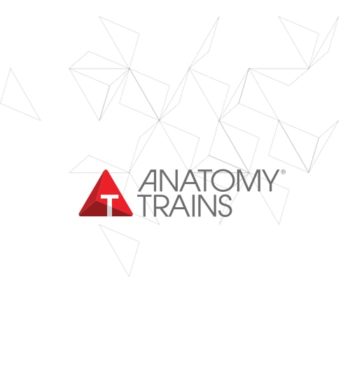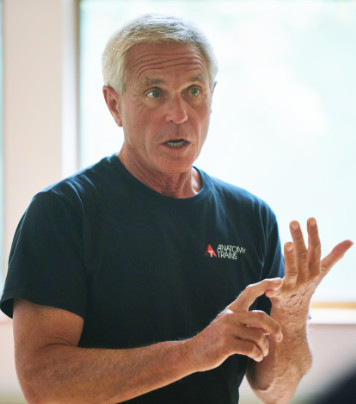Thank you for your interest! Registration for this bundle is now closed. Please email info@anatomytrains.com with any questions.
By purchasing this project you are registering for the following two webinars:
Freeing the Breath in the Neck and Shoulders Part 1: The Clavicle Live Online with Michael Watson
Following the very well received male pelvis, knees and other webinars with Anatomy Trains senior teacher Michael Watson, we will be working with in clinic models to explore how to assess, strategize, and treat clients to best liberate the breath by creating freedom in the neck and shoulders.
When breathing, the muscles in the neck and shoulders that primarily assist with inhalation are the scalene muscles and the sternocleidomastoid muscles; these are considered accessory muscles of respiration, meaning they only engage during deep breaths or when the primary breathing muscle (diaphragm) is not sufficient to draw in air, causing a noticeable tension in the neck and shoulders when activated.
Key points about neck and shoulder muscles involved in breathing:
- Scalene muscles:
Located on the side of the neck, these muscles elevate the first two ribs when contracting, which helps to expand the chest cavity and facilitate inhalation.- Sternocleidomastoid
- This large neck muscle originates from the sternum and clavicle, and when contracted, it can help raise the sternum and assist in deep breaths.
- How improper breathing affects the neck and shoulders:
- Shallow breathing:
- When someone habitually takes shallow breaths, they tend to engage the neck and shoulder muscles excessively, leading to tension and discomfort in these areas.
Muscle strain:
- Overuse of the scalenes and sternocleidomastoid due to poor breathing patterns can result in muscle strain and pain in the neck and shoulders.
- Other relevant points:
- Trapezius muscle:
- While not primarily involved in breathing, the upper fibers of the trapezius muscle can contribute to shallow breathing patterns if overly activated.
Importance of diaphragmatic breathing:
- Proper breathing technique involves engaging the diaphragm as the primary muscle for inhalation, which minimizes strain on the neck and shoulders.
This course will be provided over Zoom webinar with multiple camera views, live chat and Q&A
Recordings will be provided via password protected streaming access for 45 days.
Course schedule:
Saturday, December 21, 2024
Module 1: 10:00 AM – 12:00 PM EST
Sunday, December 22, 2024
Module 2: 10:00 AM – 12:00 PM EST
In this new webinar with Senior Anatomy Trains Certified Teacher Michael Watson, we will be working with models in clinic to share skills for BodyReading postural assessment, strategy, and treatment of the cervical spine relative to opening the breath.
The cervical spine houses structures that are crucial for breathing, particularly the nerves controlling the respiratory diaphragm, the primary muscle responsible for inhalation. Damage or imbalance to the cervical spine can significantly affect breathing function, especially if the injury impacts the nerves at the C3-C5 level which directly innervate the diaphragm.
Key points about the cervical spine and breathing:
- Phrenic Nerve:
The phrenic nerve, which originates from the cervical spinal cord at levels C3-C5, is the primary nerve controlling the diaphragm, making it critical for breathing function.- Muscle involvement:
Muscles in the neck like the sternocleidomastoid and scalenes can act as accessory muscles for breathing, assisting in deep inhalations when needed.- Impact of injury:
A cervical spine injury, especially at the C3-C5 level, can lead to impaired diaphragm function, resulting in difficulty breathing, shallow breaths, and potential need for mechanical ventilation.- Posture and breathing:
Poor neck posture can also indirectly affect breathing by placing tension on the muscles involved in respiration.This course will be provided over Zoom webinar with multiple camera views, live chat and Q&A
Recordings will be provided via password protected streaming access for 45 days.
Course schedule:
Saturday, January 4, 2025
Module 1: 10:00 AM – 12:00 PM EST
Sunday, January 5, 2025
Module 2: 10:00 AM – 12:00 PM EST
About Michael WatsonMichael Watson’s journey of self-discovery has led him around the world, teaching and sharing his passion for anatomy and alternative modalities of exercise and therapy.
Beyond yoga, Pilates and Anatomy Trains teaching certifications, Michael leads advanced training programs, retreats and clinics worldwide. He has worked with athletes with disabilities at the Paralympic level of training and continues to develop ideas that bring an integrated approach to health, movement and wellness. As a certified teacher of Yoga, Pilates, functional anatomy and with a degree in Sports science, Michael brings an in depth awareness to his clients based on a strong understanding of anatomy, the body and its function.
A proud father of 3 home birthed children, Michael is also a natural birth advocate and works progressively in his home base of Bermuda alongside his wife in bringing awareness to birth and reforming birth options for women.
Home / Anatomy Trains Store / Courses / Freeing the Breath in the Neck and the Shoulders Parts 1 and 2 Live Online with Michael Watson course bundle
Freeing the Breath in the Neck and the Shoulders Parts 1 and 2 Live Online with Michael Watson course bundle
$275.00
Course is full.
- December 21, 2024 – January 5, 2025
- Online course
- This course is intended for Online Course.
| Dates | Dec 21, 2024 – Jan 5, 2025 |
|---|---|
| Location | Online course |
| Class Times | 10:00 AM – 12:00 PM EST each day |
| Teacher(s) | Michael Watson |
| Tuition | Bundle price of $175 held until December 17, 2024 / $275 thereafter |
| Credits Earned | 4 CEUs NCBTMB; 4 CEs NPCP; 0.4 CEs NASM; 4 CEs IASI Cat 1 per webinar |
| Cancellation Fee | For cancellations up to 24 hours before the start of the course, full tuition credit to applied towards a future workshop or product. Cancellations within 24 hours before the start of the course, no refunds. |
| Contact | Francesca at 888 546-3747 or live chat on our website info@anatomytrains.com |
Get in touch if you have questions about this course.



